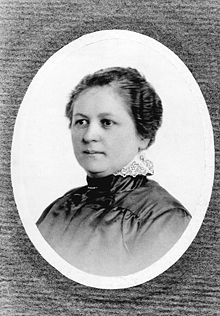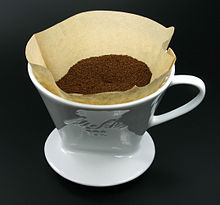This article needs additional citations for verification. (March 2024) |
Amalie Auguste Melitta Bentz (31 January 1873 – 29 June 1950), born Amalie Auguste Melitta Liebscher, was a German entrepreneur who invented the paper coffee filter in 1908. She founded the company Melitta, which still operates under family control.
Melitta Bentz | |
|---|---|
 | |
| Born | Amalie Auguste Melitta Liebscher 31 January 1873 |
| Died | 29 June 1950 (aged 77) |
| Occupation | Entrepreneur |
| Spouse | Hugo Bentz |
| Children | 3 |

The Melitta filters, made with specialized paper, transformed coffee brewing by simplifying it, the innovation also addressed issues of wastage and cleanliness.
Early life edit
Amalie Auguste Melitta Bentz was born on January 31, 1873, in Dresden, Germany. She grew up in a family of entrepreneurs; her father was a publisher and book salesman, and her grandparents owned a brewery. In the late 1890s, she married Johannes Emil Hugo Bentz, a small business owner, and they had three children: Willy, Horst, and Herta. Living as a housewife in Dresden, Melitta was tasked daily with brewing coffee, a common chore that would lead to her invention.
Invention and early corporate growth edit
The point Melitta aimed to address was the unsatisfactory method of brewing coffee prevalent at the time. The standard methods, including porcelain percolators or fabric filters, often resulted in over-brewed coffee with grounds floating in the cup. This was not only unpleasant but also took away from the coffee's flavor and quality. Melitta was dissatisfied with this and sought a way to brew a cleaner and more enjoyable cup of coffee.[1]
In 1908, she tried to use a brass pot and a piece of blotting paper from her son's school notebook to create a prototype filter. By punching holes in the bottom of the pot and lining it with blotting paper, she successfully filtered out the coffee grounds, leaving a clear, flavorful brew. This simple yet effective method was a significant improvement over the existing brewing techniques. The coffee filter was not only effective in trapping the grounds but also allowed the coffee's flavor to shine through. Realizing the potential of her invention, Melitta filed for a patent and founded her company, "Melitta", in a room of her family’s apartment with a starting capital of 72 pfennigs. Her husband and sons were the company's first employees. Melitta and her husband started with only 100 cartons of filter paper and made 50 filters. They would go around visiting shops in Dresden to present their invention. In 1909, Melitta presented the filters at the Leipzig Trade Fair and achieved high demand for her product with more than 1,200 units sold.[2] In 1910, Melitta improved on the original design of the filter. This new round pour-over was structured into three parts, which were a removable water distributor, a filter body, and a sieve insert.[3] The product quickly gained popularity, and the business flourished, receiving a gold medal at the International Hygiene Exhibition in Dresden. With this growing success, the company grew to eight people in 1912.[4]
Struggles during World War I edit
As World War I broke out across Europe, Melitta’s business encountered several problems. For starters, Melitta’s husband and her elder son, Willy, were drafted into the German Army. Melitta’s brother, Paul Liebscher, was able to help keep the company afloat during the war.[4] Getting materials for the business became difficult during the war. Metals were being used for Zeppelin construction and paper was rationed, which were key materials used to make and be able to use her coffee filters. Furthermore, the British blockade of Germany made it extremely difficult for coffee beans to be imported into Germany, and demand for her product began to fall.[5]
Post-war period and expansion of company edit
After World War I ended, the business was able to resume normal operations. However, post-war Germany faced widespread poverty and rampant inflation. Despite these economic setbacks, the company was able to thrive once again. In 1923, her eldest son Willy became the co-owner and increased sales significantly.[2] During the early 1920s, there were several imitators of Melitta’s coffee filter design. In 1925, in order to combat these imitators, the company created the red and green packaging that is still used to this day to separate itself from imitators.[3]
The company was experiencing tremendous success and needed to expand its production capacity. In 1929, the company moved from its Dresden factory into Minden where the plant is still in use to this day. In the 1930s, the company patented the paper filters that are also still used to this day.[4] To further protect the business from imitators, in 1932 the first Melitta lettering was introduced as another identifying feature to consumers. The lettering was changed slightly in 1937 but remained the same onwards.[3] Melitta and her husband stepped down from daily operations in 1932 and passed control over to their children. Melitta would still play a role in the business when it came to providing better working conditions for their staff. She established a five-day work week, three weeks of vacation time, and a Christmas bonus. She also founded Melitta Aid in 1938 as a social fund for employees.[4]
Legacy and impact edit
Melitta Bentz passed away at the age of 77 on June 29, 1950. Her legacy still lives on to this day. Melitta was one of the first women in Germany to have her own personal invention protected by a patent.[4] Today, Melitta Bentz's invention is still in use and has evolved with advancements in coffee brewing technology. Her company, still a family-run business, has grown into a global enterprise, offering a range of coffee-related products. The family business now produces 50 million coffee filters every day, because despite tabs and capsules, the classic filter coffee continues to enjoy great popularity. [2]
Melitta Bentz's legacy extends beyond this invention. Her commitment to improving not only the coffee brewing process but also the working conditions of her employees was remarkable. She introduced benefits such as Christmas bonuses and paid vacations, and established "Melitta Aid" for employees in financial distress. This holistic approach to business, focusing on both product innovation and employee welfare, was ahead of its time and set a precedent for future entrepreneurs.
See also edit
References edit
- ^ "Melitta Bentz: The Woman Who Revolutionized Coffee Brewing". Craft Coffee Guru. Retrieved 2023-12-08.
- ^ a b c DPMA: Melitta Bentz´ Coffee Filters. Deutsches Patent- und Markenamt. (2024, January 17). https://www.dpma.de/english/our_office/publications/ingeniouswomen/110jahrekaffeefilter/index.html
- ^ a b c Melitta® - Melitta® journey through time. (n.d.-a). https://www.melitta.com/en/Melitta-Journey-through-Time-541.html
- ^ a b c d e The New York Times. (2018, September 5). Overlooked no more: Melitta Bentz, who invented the Coffee Filter. The New York Times. https://www.nytimes.com/2018/09/05/obituaries/melitta-bentz-overlooked.html?searchResultPosition=1
- ^ Coffee and WWI. National WWI Museum and Memorial. (n.d.). https://www.theworldwar.org/learn/about-wwi/coffee-and-wwi
- "Overlooked No More: Melitta Bentz, Who Invented the Coffee Filter." The New York Times, 5 Sept. 2018, www.nytimes.com/2018/09/05/obituaries/melitta-bentz-overlooked.html.
- Reed, Lawrence W. "How a German Housewife Fed up with Grounds in Her Coffee Revolutionized the Famous Drink." Foundation for Economic Education, 9 Apr. 2020, fee.org/articles/how-a-german-housewife-fed-up-with-grounds-in-her-coffee-revolutionized-the-famous-drink.
- Gourdeau, CC. "Melitta Bentz Changed the Way We Brew Coffee Forever." Tasting Table, 3 Dec. 2022, [www.tastingtable.com/1117773/melitta-bentz-changed-the-way-we-brew-coffee-forever](http://www.tastingtable.com/
Further reading edit
- Hempe, Mechthild (2008). Written at Minden, Germany. Melitta Unternehmensgruppe (ed.). 100 Jahre Melitta - Geschichte eines Markenunternehmens [100 years Melitta - History of a brand company] (in German) (1 ed.). Cologne, Germany: Geschichtsbüro Verlag / Geschichtsbüro Reder, Roeseling & Prüfer GbR. ISBN 978-3-940371-12-6. (2+140+2 pages) (NB. There is also a French translation named 100 années Melitta - L'histoire d'une marque. Reportedly, English and Brazilian translations exist as well.)
- Schwenke, Philipp (2021-09-04). "Wie Melitta Bentz den Kaffeefilter erfand und damit einen Weltkonzern schuf - Melitta Bentz – Erfinderin, Gründerin, Phantom". Wirtschaft & Politik > History & Crime. Capital. Pionierinnen der Wirtschaft (in German). Vol. 2021, no. 9. Retrieved 2024-01-27.
- "The invention of the coffee filters - Melitta Bentz, mother of filter coffee: Inventor and entrepreneur". German Patent and Trade Mark Office (DPMA). 2023-01-27. Archived from the original on 2023-01-29. Retrieved 2023-01-29.